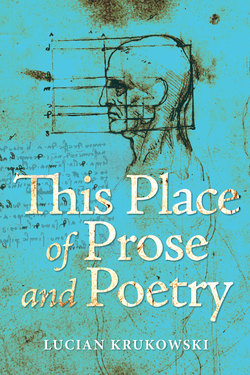Читать книгу This Place of Prose and Poetry - Lucian Krukowski - Страница 23
На сайте Литреса книга снята с продажи.
FIVE WORDS, A STORY
ОглавлениеA Who is the antipode of a What. To be a Who is the stuff of extravagance, illusion, loneliness, and—now almost forgotten—the sickness of the soul (before “soul” was left behind to become the “mind”). Now, they say, the soul is back—infecting mind with its older sickness—just to keep the What’s away.
We’ve seen that happen once—it didn’t take long—just a cosmic instant in a lifetime. So we can now assume geriatric privilege and unload our Who, without shame or pity, onto those once-luscious other Who’s who still come to eat and drink at our stained, unfashionable table.
They are all my friends—bumbling long-humbled stumblebums, truth-finders and sometime pleasure-seekers, long-disappointed artists and their plumped-out models, and the dear-old-others who will always come for bread and wine. But they are now outnumbered by errant gossips and mal-formed critics—the usual irritants—who are there to gloat (they are all so young) over the ugliness of pretentious old age, and if that’s not enough—to spot some smidgeons of my outworn worth they can vilify and macerate in tomorrow’s section of the Arts-And-Entertainment-Daily.
But because they have come to eat our food and drink our wine, we are free to lecture them about our sense of What and Who—and baste them with the hot-sauce of disputative barbeque—so that (for once) they can taste the acrid (and yet curiously refreshing) distinctions we make between the good and bad, and suffer our indifference to their choosing between the ins and outs of arty contraband.
Why, anyway, should those creeps just sit and smile when I show them what they are and who I am? It’s a difference, they might say, that is only important for the age-old, old-age exercise of taste and hate. But as they regard specific-me as taste-free, and yet have come to hate (and be hated by) the universal me, they cannot believe there is a difference between my Who—when compared to their What—when they were offered it at a tasting of the first cold pressing of my inner olive. Of course, they do not know the weather and the soils which produce the best of oils. They do not know what it is like to be hand-picked and then hard-pressed. But in my refuge, partying with my faithfuls, I care more about eating olives before they’re pressed. I do not tell them that—but if they are not more caring about what they think (and taste)—they will soon be buying olive oil that is a blend from out of Texas, Kansas, and Hoboken.
Consider now, the difficulties in linking a What with its Where—which linking was once considered a fool-proof way to distinguish What’s from Who’s: A What needs a Where (to be somewhere) more than does a Who. Who’s are never sure as to where they are. But it does matter to a bona-fide ambitious What that there are Where’s—inhabited by pundits, moguls, and promoters—developers of the latest circular about the straight path that shows the fastest way-to-go. Such documents, although expensive—are always there for the What in you.
Who’s, alas, have become unfashionable because they contribute more to obscure journals than to the real-life interests of a What in search of a suitable Where.
So it is surprising that there are still Who’s brave enough to step into the fluorescent light and proclaim that the controversy between them and What’s continues to make a difference. Surprising, also, that there are Who’s—despite all physiologic evidence (trepanning, truth-serums, electric-shock, lobotomies, and the like)—who (in their essence) proclaim independent from their What’s. What is an essence for—but to make a distinction that is a difference?
And then there are the What’s (now in the majority) who believe that a What is to a Who as brain is to mind—the latter term, in both cases, signifying an atavism of only historical interest, and now ready for discarding—or redistricting.
